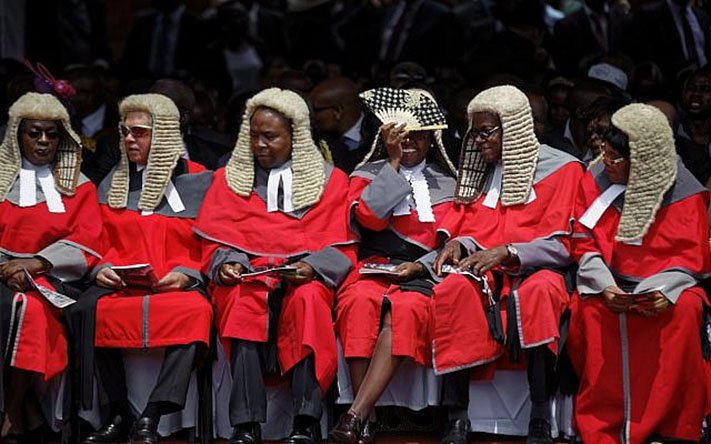A UK based former Zimbabwe High Court judge, David Bartlett (67), who quit the bench in 2002 during the time the late former President Robert Mugabe was in charge, has now applied to be considered for appointment to the Constitutional Court in Zimbabwe.
In the UK, Bartlett was appointed an Immigration Adjudicator in 2002 (now known as Judge of the First Tier Tribunal (Immigration and Asylum Chamber). He retired in November 2015.
When Bartlett quit in 2002, he gave no reasons for doing so. But a year before that, four judges mainly white, quit the bench, while a fifth, Chief Justice Anthony Gubbay was forced to retire.
Under Gubbay, the Supreme Court had ruled that the state sanctioned confiscation of white-owned farms was illegal. Ruling party militants led by Joseph Chinotimba stormed the Supreme Court in December 2000, vowing to drive some judges from office and shouting: “Kill the judges.”
Gubbay was then replaced by Mugabe loyalist, the late Godfrey Chidyausiku who wasted no time in packing the Supreme Court with inexperienced legal practitioners. It came as no surprise the court would later overturn the previous rulings and back the chaotic seizure of white owned farms.
It will be interesting to see how Mnangagwa reacts to Bartlett’s application. It was Bartlett who summoned Mnangagwa, then Speaker of Parliament, to explain the early release of a convicted bank robber, George Tanyanyiwa Chikanga who claimed to have been related to Mnangagwa.
Leonard Zuze, a former prison inmate told the local Daily News at the time that Chikanga had claimed he was Mnangagwa’s son. However Mnangagwa denied the allegation through his lawyers. He successfully sued the paper and was awarded Z$5 000 000 in damages in June 2004.
It was also Bartlett who ordered the inquiry that led to the successful prosecution and conviction of the late former President Canaan Banana on sexual assault charges in 1999.
When Bartlett quit in 2002, the state owned Herald newspaper said his resignation was “a sign white judges were leaving the bench after realising they were losing grip on the judiciary”.
Meanwhile the Constitutional Amendment Bill, which seeks to amend the Constitution by empowering the President among other things to appoint judges to the Supreme Court and Constitutional Court without the need for public interviews was tabled in Parliament on Thursday.
Based on the 2013 constitution judges are to be appointed “after a thorough and public process involving: advertising the position; inviting the President and members of the public to nominate candidates; conducting public interviews of candidates; and preparing a list of three qualified nominees to be submitted to the President from which the President makes his/her selection.”
Mnangagwa’s administration started of with the first Constitutional Amendment Act of 2017 which nullified the consultation process for the appointment of the Chief Justice, Deputy Chief Justice or Judge President of the High Court, and the Judicial Service Commission (JSC), who are appointed by the President on the recommendation of the JSC without public interview.
Critics say the final nail will be delivered by the latest amendments which will effectively revert back to the appointment system that was in place before the 2013 constitution. The amendments also change the way in which judges retire. Instead of retiring at 70, the president will be able to extend their terms on rolling contracts for up to an additional 5 years, thus making them vulnerable.
UK based law lecturer Alex Magaisa has noted that the “proposed changes to the appointment of serving judges of the Supreme Court remove checks and balances on presidential powers and brings back an opaque and unaccountable process which had been abandoned in 2013.”







1 Comment